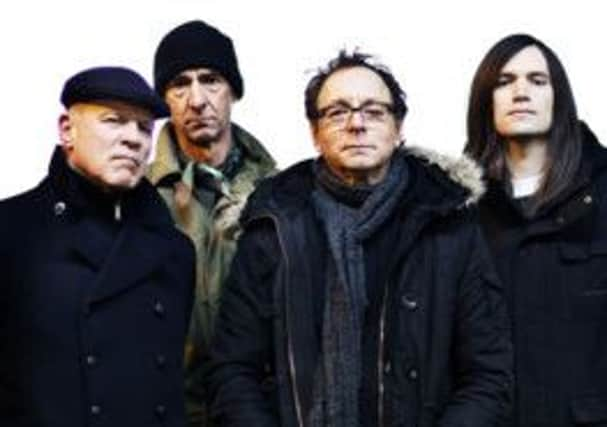‘No respect for convention, we do what the hell we want’


Words like experimental, influential, innovative and seminal are used a lot when the music press name-check Wire.
That also suggests sales have been lacking over the years, despite the critical acclaim. But 37 years after their formation, Wire are still producing great material.
Advertisement
Hide AdAdvertisement
Hide AdAnd visitors to Preston’s New Continental can see and hear that for themselves tomorrow, as they showcase their 13th studio LP, Change Becomes Us.
Wire formed in London in 1976, with Colin Newman (guitar, vocals), Graham Lewis (bass, vocals), Bruce Gilbert (guitar), and Robert Gotobed (now Gray, drums) initially associated with the punk scene.
One critic felt their early albums ‘expanded the sonic boundaries not just of punk, but rock music in general’, with Wire now regarded as the definitive art punk or post-punk ensemble.
They developed from 1977’s raucous Pink Flag to a more complex sound, with increased use of guitar effects and synthesizers on 1978’s Chairs Missing and 1979’s 154. Wire soon gained a reputation for experimenting, something continuing to this day, with Matthew Simms now in Bruce Gilbert’s guitar role.
Advertisement
Hide AdAdvertisement
Hide AdThe Preston visit precedes an appearance at Skipton’s Beacons Festival, with more dates in England, Glasgow and Dublin in September before a switch to mainland Europe then the second part of their US tour.
Colin said: “The first part was themed around Chicago’s Pitchfork Festival, and they loved it. We did rather better than we thought in numbers and the general effect of the tour. We’ve been on a roll these last three years in what we’ve released and live reception. We’re definitely attracting more of an audience, and quite diverse.”
It’s been a special 2013 so far, the new album well received since its unique Drill: London – Wire launch, culminating in a headline London show, playing Change Becomes Us in its entirety.
“The festival was quite intense but went incredibly well, performing the album for the first time live with a sell-out at Heaven.
Advertisement
Hide AdAdvertisement
Hide Ad“It’s a very Wire-like thing to do, but there’s an irrefutable logic about showcasing new songs rather than greatest hits.
“You need to constantly review what you do, and this year saw two innovative album launches – the Bowie LP announced the day before it came out, and the more underground approach of My Bloody Valentine. Both created a lot of attention with minimal effort.” Colin was pleased with the reaction to the LP, not least Mojo’s ‘how to buy Wire’ guide a month later putting that and 2010’s Red Barked Tree in the band’s ‘top six’ albums.
“That puts incredible pressure on us, doing two ‘classic albums’ in a row. If we come up with a third, we’re in territory not many bands of our vintage have been.
“You’re not expected to produce work as good as you did when you were younger. But we’ve no great respect of such conventions. We do what the hell we want, ambitious for it to be good.”
Advertisement
Hide AdAdvertisement
Hide AdThe new album was dubbed Wire’s ‘missing fourth album’, as it involved unreleased recordings from the tail end of the initial 1976-80 phase. But Colin said that’s only part of the story.
“The material itself has its roots in that period but underwent changes. We saw it as a project, but towards the end of the mixing, realised most who didn’t know the back story would think it was just a new Wire album.
“That made sense. It has this element of a former period, giving it almost like the grit in the oyster shell, forcing a certain aesthetic.”
After the initial 1980 split, it was five years before Wire returned. They disbanded again in 1992, reforming a second time in 2000, their sabbaticals sharpening their focus.
Advertisement
Hide AdAdvertisement
Hide AdYet Colin added: “Wire never stopped working. Since 2008 the band has moved forward all the time. People are excited to move forward with the band - we become more like an unstoppable force.” Colin never felt part of the original punk scene, adding: “There was no such thing as post-punk then as a concept. Similarly, we never tagged ourselves experimental. If anything, we’ve flirted with the concept that we’re a psychedelic pop group. There’s something about the attitude of the ‘60s, when people thought anything was possible in music.
“There’s a strong element of that in Wire. We don’t feel we need this kind of guitar sound, this kind of drum sound. There’s a real limitation about that.”
Their influence remains, those queueing up to praise Wire including Blur, REM, Manic Street Preachers and Franz Ferdinand.
But Colin added: “Although it’s fantastic to be admired by your peers, you don’t want to be completely that!”
Advertisement
Hide AdAdvertisement
Hide AdHe added the example of his accountant’s independent spin on the band, saying: “She knew about Wire but never really knew the music. She came to see us and backstage after was completely gushing, saying ‘you’re the band that stands behind every band I’ve ever loved’. We don’t have the broadest possible appeal, but if you’re seriously into music and have never heard Wire, it’s a band you’ll find something good in.”
And what can we expect at the New Continental? “A band that’s pretty hot right now. We won’t have played for a couple of weeks, but won’t be rusty.
“We’re in a good place, having a lot of the energy of the American tour. It should be a good night.”